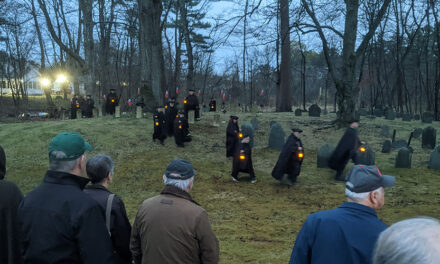‘Good always trumps evil’ says abutter
Published in the April 27, 2016 edition
By MAUREEN DOHERTY
LYNNFIELD — In an unprecedented turn of events, Kinder Morgan announced late last week that the company has indefinitely suspended its plans for the 420-mile natural gas pipeline that would have cut through the state.
Proposed to enter Massachusetts from New York state and exit at the Atlantic Ocean on the North Shore, dozens of properties in Lynnfield were in its path on the portion of the Tennessee Gas Pipeline (TGP) called the “Lynnfield lateral” which extended off the main line in Dracut to the ocean.
In announcing the suspension of investment in the project, Kinder Morgan cited both its inability to sign on enough end users to make the $3.3B project feasible and the open-ended regulatory climate in dealing with the New England states that made it impossible to guarantee its success as factors in its decision.
“Unfortunately, despite working for more than two years and expending substantial shareholder resources, TGP did not receive the additional commitments it expected,” Kinder Morgan said in a statement. “As a result, there are currently neither sufficient volumes, nor a reasonable expectation of securing them, to proceed with the project as it is currently configured.”
The news created a collective sigh of relief from local opponents and came in the wake of six contentious public hearings held across the state during the first two weeks of April before the state Department of Public Utilities (DPU), including one held at the LMS attended by several hundred opponents.
“Increased gas capacity not needed”
“We first found out via text message which was followed-up by a series of e-mails and then verified via an official press release. The overall tone of the communication was positive, and particularly amongst neighbors as we’ve all become united in this cause,” said AJ Qualtieri, a direct abutter at 17 North Hill Dr.
Qualtieri was not surprised that the company admitted it did not have enough customers to make this a viable project.
“The Attorney General’s office released a study in November concluding that increased gas capacity is not needed to meet the state’s energy needs and that there were cheaper and cleaner alternatives to a gas pipeline, so this was not surprising to us,” Qualtieri said.
He added, “Despite the company’s claims that the primary purpose of the $3.3B project was to satisfy demand in the region and lower costs, it was more likely than not that exporting gas to increase profits were its primary goals, not to help local citizens.”
Qualtieri, who testified at the DPU hearing that the pipeline’s route through his backyard was not disclosed when he and his wife purchased their home 15 months ago even though Kinder Morgan began pursuing this project 2 1/2 years ago, said he believes the growing opposition from the public and politicians influenced Kinder Morgan’s decision.
“Absolutely, I think it played a role and I’m proud of our town, our neighborhood and various constituencies helping the cause. In the same token, the economic reality of the situation also had a great influence. With energy prices collapsing and many oil producers in financial distress, Kinder Morgan needed to conserve capital to sustain itself as its profits and share price collapse,” Qualtieri said.
“The companies can lobby all they want to create the climate that is appropriate for them to succeed but ultimately it is a supply and demand story and the economics don’t add up. Not to mention the impact on local communities like Lynnfield. They did not present a case for domestic need and that was reflected in low commitment levels from customers. I think there are alternatives that make more sense,” Qualtieri believes.
“We fought the good fight and we won”
Roy Pincus of 25 North Hill Dr., is another direct abutter who testified at the DPU hearing that he and his wife were not made aware of Kinder Morgan’s plans when they purchased their home 18 months ago. The extensive wooded easement between his property and his neighbor at 27 North Hill Dr. dates back to the 1940s but has never been used.
“To say that my family and I are overjoyed would be the understatement of the year. We’re beyond elated,” Pincus told the Villager Friday.
Pincus recalled being in shock as his cell phone lit up with e-mails from attorneys, neighbors and elected officials just as he was putting it away while on the tarmac about fly home after a family vacation.
“I was so incredibly ecstatic and I just thought, ‘Wow, we fought the good fight and we won.’ I was really satisfied that the time and energy put into fighting this, by both myself and everyone involved in the community and all over the state, proved to be worth it. It paid off in the end,” Pincus said.
One attorney wrote: ‘Roy just letting you know that I heard the news that the pipeline is dead,’ Pincus recalled. The other attorney had written: ‘I just heard news that the pipeline project is not going to happen. I hope that is true.’”
Pincus felt the need to re-read the e-mails before sharing the news. “I knew it was legit when my neighbor e-mailed: ‘Project dead’ with a link!”
After sharing the news with his wife and mother-in-law on the plane, he starting messaging friends and family members. “And one of them came back with: ‘The ultimate David vs. Goliath victory.’ That’s what I wrote to some of my people: ‘We beat the big, bad monster!’” Pincus said.
“At the end of the day, good always trumps evil,” Pincus believes. “The reinforcement of our fight and what we had been saying all along – and what the Attorney General’s study had shown – was there was no need for this pipeline. And their spin on it is they’re pulling the plug because of lack of commitments from local gas distribution companies. Of course! You didn’t have them sign up because we don’t need it!” Pincus said.
Pincus said the AG’s report combined with the information he and other opponents had gathered through eight months of educating themselves on the issue gave them “a really solid understanding of what’s going on with energy needs in our area.”
During the DPU hearing in Lynnfield, abutters like Qualtieri and Pincus, as well as local and state elected officials, objected vociferously to the pipeline, citing its negative impact on private property rights, sources of public drinking water – including Lynnfield’s wellfields and watershed – as well as protected conservation lands. Many expressed doubt that the natural gas flowing through the pipeline would be used for the local market, citing the pipeline’s ability to connect to the Maritimes and Northeast Pipeline off the coast of Massachusetts that would send it to Nova Scotia.
Opponents were also critical of the company’s strong arm tactics, which they told the DPU was tantamount to bullying in an attempt to force abutters into signing agreements to allow TGP to survey their properties or face eminent domain proceedings.
The company was petitioning the DPU for permission to enter the properties of over 450 abutters who had denied TGP access, which it claimed was necessary to complete the permit pending before the Federal Energy Regulatory Commission (FERC). Those objecting to this action by TGP said the survey process itself would be detrimental to their properties because it would involve tree cutting, drilling into the ground and disturb conservation land and vernal pools.
After the hearing, a DPU official told the Villager that no one had spoken in favor of the proposal at the three prior hearings. The final two hearings in Dracut and Andover were met with opposition as well.
“It’s dead”
“The town is obviously pleased with the decision that came down yesterday. But at this point it is a postponement or a deferral; they haven’t withdrawn it. So we’ll keep an eye on it, but for all intents and purposes, it’s dead,” Town Administrator Jim Boudreau told the Villager.
“Short of an actual withdrawal, this is the best news we could get,” Boudreau added but stated on Friday it was not clear whether Kinder Morgan’s decision to suspend the project also suspended the public hearing process pending before the DPU, which had previously been accepting written comments from the public through May 6.
DPU suspends further action
A spokeswoman from the DPU contacted by the Villager on Monday confirmed that subsequent to the announcement that further work and expenditures on the Northeast Energy Direct project was being suspended, “the Department of Public Utilities granted a request made by Tennessee Gas Pipeline Company to suspend any further action in its survey petition cases.”
Katie Gronendyke, press secretary for the state Executive Office of Energy and Environmental Affairs stated, “As a result of the ‘stay’ of any further action, the Department has terminated all deadlines in the case, including the May 6, 2016 deadline to file written comments. No further action by any affected property owner or public commenter is necessary at this time. It is anticipated that the company will withdraw its petitions in the above-referenced matters.”
The FERC application involves a separate process with federal rather than state agencies. “It has not been withdrawn from FERC,” Boudreau said. “Until it’s actually withdrawn I would say if people have comments that they should stick with the deadline until they’re told otherwise.”
“Great news”
“This was great news for the town of Lynnfield and especially the residents directly affected in the North Hill area. Our town land will not disturbed as well as the Water District land that is near our drinking water supply,” Selectmen Chairman Phil Crawford told the Villager.
Crawford testified at the DPU hearing in Lynnfield April 6. “The lack of end users was the reason I was given as to why Kinder Morgan shut down the Boston office and terminated all the regional employees and sub-contractors. This is why I insisted the DPU question whether or not this project was going to go forward before they consider approving Kinder Morgan’s request to do surveys and be allowed to go onto private property,” Crawford said.
Crawford said a former Kinder Morgan employee told him he expected they would continue with the FERC application. “I’m sure we have not heard the end of this and the fact that they have only ‘suspended’ the project has me concerned. The energy sector has seen prices driven down by foreign countries to ultimately put companies like Kinder Morgan out of business. Prices will rebound at some point and, whether it is Kinder Morgan or another energy provider, I would expect the pipeline project will be resurrected,” Crawford believes.
“The protection of the rights of private property owners and their property, town-owned land, conservation land, wetlands and water supplies needs to be addressed at both the state and federal levels and I would support these efforts on behalf of the town and its residents,” Crawford said.
“Must remain vigilant”
“The decision to stop the pipeline is great news for the town of Lynnfield. I applaud the efforts of the many people in town who worked so hard to stop this project,” Selectman Chris Barrett told the Villager.
“This is another great example of what the town can accomplish when we come together to protect the best interests of our community. We must remain vigilant as a town to oppose any changes of this magnitude that would negatively impact the wonderful character of our town,” Barrett added.
“A reprieve” only
North Reading Selectman Jeff Yull, who was the spokesman for the Northeast Municipal Gas Pipeline Coalition at the DPU hearing, which represents towns affected by the pipeline route, including Lynnfield, cautioned this may not be the last we’ve heard of the pipeline.
“I’m not confident it’s over and done. They suspended the project but didn’t terminate it. I see this as a reprieve until the prices (of natural gas) move up. The possibility of a pipeline will remain for years to come until FERC denies the project or the filing has been withdrawn,” Yull believes.
All the same, Yull is pleased with the outcome at this point. “This is good news. The manner in which Kinder Morgan pursued the project was not positive for abutters. They didn’t appear to be falling over themselves to overcome the opposition,” he said.
State Rep. Brad Jones said Kinder Morgan’s decision was “wonderful news.” He considers company’s decision to abandon this project “a victory for the residents of the 20th Middlesex District.”
“From the outset, legitimate questions were raised about how this project would impact the environment, public health and public safety but Kinder Morgan was never able to adequately address those concerns. It was also becoming increasingly clear that the gas flowing through this pipeline would have been used primarily for exporting purposes, with no direct benefit for Massachusetts,” Jones said.
Abutters were collateral damage
“I’m not an elected official. I’m just one person whose property was going to be destroyed,” Pincus told the Villager, adding, the pipeline was “the last thing I thought about when I went to bed and it was the first thing I thought about when I woke up. That’s how much it consumed me.”
The easement between 25 and 27 North Hill Dr. dates back to the 1940s and runs from the street along the entire property line for 185 feet, where it joins the woods in the rear of the lot. At that point, the easement would turn right and head toward Peabody, he said.
Untouched for at least 70 years, the easement creates a thick stand of dozens of mature trees, many of which are 50 to 60 feet tall. Pincus’s front door faces his neighbor at 27, the back door faces his neighbor at 23 and his garage and driveway face North Hill Drive. The distance from his front door to this stand of trees is about 90 feet.
Kinder Morgan’s plan would have removed every single tree in the easement and put the pipeline down the middle of it. It would be required to be kept clear of all vegetation for a width of 50 feet — 25 feet on both sides of the pipeline — in perpetuity.
In addition, Kinder Morgan intended to take another 25 to 35 feet of Pincus’ property as a staging area for its construction equipment along the easement, which would be fenced off from the rest of yard, bringing the fence line to within 30 feet of his front door.
“I was going to lose at least half of the yard, including one-half of the U of my driveway. They would have taken it all and fenced me off, which would have pinned me in,” he said.
This would have taken away one of the greatest joys of his life – playing ball in his yard with his three boys, a 9-year-old and 6-year-old twins. He didn’t have the heart to tell his boys. A Kinder Morgan representative told him: “Don’t forget, you will be compensated for the loss of your property.”
This provided Pincus with no solace whatsoever. “I said, so what am I supposed to show my kids, a check? They’re really going to feel good about that? You don’t seem to understand. There is no dollar amount you can put on me playing ball with my kids every day in my yard. That’s what I was up against,” he said.




